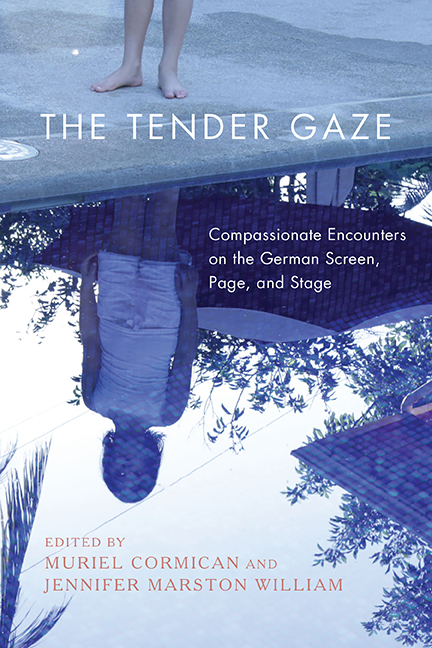Book contents
- Frontmatter
- Contents
- Acknowledgments
- Introduction: The Tender Gaze
- 1 Toward a Theory of the Tender Gaze: Affect, Critical Insight, and Empathy in Contemporary German Cinema
- 2 The Tender Gaze, Embodied Politics, and Perspective-Taking in German Postdramatic Theater
- 3 Face to Face: Race, Gender, and the Gaze in Mo Asumang’s Die Arier
- 4 “Risse, hinter denen man einen Kern entdeckt, der so ähnlich ist wie die Herzen von uns allen”: The Tender Gaze in Umut Dağ’s Risse im Beton
- 5 Looking through the Eyes of Empathy: Encouraging a Culture of Caring and Compassion in Doris Dörrie’s Keiner liebt mich
- 6 The Tender and Transgressive Beast Within: Escape Narratives in Films by Krebitz, Stuber, and Speckenbach
- 7 Looking at Looking in Margarethe von Trotta’s Das Versprechen
- 8 A Queer Phenomenology of Gender in Maren Ade’s Alle Anderen and Toni Erdmann
- 9 Rilke’s “Schauen”
- 10 Pity Stares or Tender Gaze? Seeing Disability in Nineteenth-Century Austrian and German Literature
- 11 The Sociohistorical and Gendered Implications of Gazing Tenderly in Ludwig Tieck’s “Liebeszauber”
- 12 Mothering, Animals, and the Surveillance State in the Anthropocene: An Ecofeminist Reading of Birgit Vanderbeke’s Die Frau mit dem Hund
- Notes on the Contributors
- Index
Introduction: The Tender Gaze
Published online by Cambridge University Press: 05 October 2022
- Frontmatter
- Contents
- Acknowledgments
- Introduction: The Tender Gaze
- 1 Toward a Theory of the Tender Gaze: Affect, Critical Insight, and Empathy in Contemporary German Cinema
- 2 The Tender Gaze, Embodied Politics, and Perspective-Taking in German Postdramatic Theater
- 3 Face to Face: Race, Gender, and the Gaze in Mo Asumang’s Die Arier
- 4 “Risse, hinter denen man einen Kern entdeckt, der so ähnlich ist wie die Herzen von uns allen”: The Tender Gaze in Umut Dağ’s Risse im Beton
- 5 Looking through the Eyes of Empathy: Encouraging a Culture of Caring and Compassion in Doris Dörrie’s Keiner liebt mich
- 6 The Tender and Transgressive Beast Within: Escape Narratives in Films by Krebitz, Stuber, and Speckenbach
- 7 Looking at Looking in Margarethe von Trotta’s Das Versprechen
- 8 A Queer Phenomenology of Gender in Maren Ade’s Alle Anderen and Toni Erdmann
- 9 Rilke’s “Schauen”
- 10 Pity Stares or Tender Gaze? Seeing Disability in Nineteenth-Century Austrian and German Literature
- 11 The Sociohistorical and Gendered Implications of Gazing Tenderly in Ludwig Tieck’s “Liebeszauber”
- 12 Mothering, Animals, and the Surveillance State in the Anthropocene: An Ecofeminist Reading of Birgit Vanderbeke’s Die Frau mit dem Hund
- Notes on the Contributors
- Index
Summary
IN THE 2011 FILM Almanya—Willkommen in Deutschland (Almanya— Welcome to Germany), Yasemin Şamdereli depicts a spectrum of complex human emotions in a fundamentally compassionate film that emphasizes gentle decencies among a diverse array of people. The film tells the story of a Turkish immigrant couple, Huseyin and Fatma: their life between Turkey and Germany, their struggles raising four children, and their ultimate success in building a close-knit family despite many obstacles. In an important scene, Fatma (Demet Gul) enters a German store intending to buy bread and milk. The camera adopts her perspective, panning up over a dizzying array of unfamiliar products—cans of corned beef, jars of cured meat in gelatin—then cutting to a medium shot of her looking toward the source of an indiscernible spoken gibberish. A reverse shot shows a German male shopkeeper speaking to Fatma, ostensibly in German. A further series of shot/reverse shots show the two trying to communicate and ultimately failing when instead of the bread she asks for, Fatma is offered an enormous roll of salami, but not before her eyes come to rest on a figurine of a pig that is situated on the counter to her right, slightly above her eyeline. A second exchange about milk proves successful, and Fatma and the shopkeeper celebrate. During the exchange, Fatma, supposedly speaking in her native Turkish, uses nativespeaker German while the German shopkeeper, supposedly speaking German, uses invented words and sounds. Anyone who speaks German will understand everything she says but will be flummoxed by the sounds coming from the shopkeeper's mouth.
The camera work and the use of German and gibberish in this scene align viewers with Fatma and alienate them from the shopkeeper. Her words are fully comprehensible to what must be the anticipated viewers of a film made in German to be released in Germany. So what does it mean that both camera and language function here to distance many presumed viewers from representations of “themselves” and to invite them to identify with the very often othered Turkish immigrant who does not speak the language of the country in which she lives? What affect might the filmmaker be aiming for?
- Type
- Chapter
- Information
- The Tender GazeCompassionate Encounters on the German Screen, Page, and Stage, pp. 1 - 16Publisher: Boydell & BrewerPrint publication year: 2021



